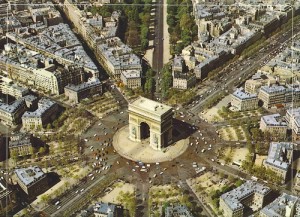For the last few years in my marketing biz, I’ve been listening to people say “Great idea, but we can’t because _____.” The usual excuse was “the budget,” but after a while you stop falling for that. Especially when you see where said measly budget gets spent (or wasted). I think in fact the real reason is often a lack of faith, a deficit of daring. Too bad. No one ever makes breakthrough creative without risking something.
In writing, especially poetry, no boundaries exist, except in the faint of heart or limited of imagination. If you want a grain silo full of chorus girls in your poem, you just plunk one down, as Richard Hugo taught us in The Triggering Town. If you want a talking walrus or a headless queen or a flying monkey or a jump-roping jackass, just make one up with the flash of a pen. If the poem or story wants it and you’re willing to earn it from the reader, anything goes. The point is no one ever made it memorable by playing it safe.
This is true in any art form. Think of Isadora Duncan’s dance moves or Dorothea Lange’s photographic portraits, Mary Cassatt’s pastels and paintings, or Virgina Woolf’s essays and novels. The world might not embrace the “new form” when it first arrives, but it’s the work that dances the edges that keeps the art alive.
Poetry is exceptionally malleable, lean, and agile, and pliability is among its greatest attractions—and challenges. Poetry jukes and jives and doesn’t care if it litters your mind with a thousand slaughtered weak ideas. In fact, it purges our minds of feeble thoughts by bringing in bigger, stronger, fresher ones. New metaphors, vibrant imagery, juicy verbs. “True wit is nature to advantage dressed/ What oft was thought, yet ne’er so well expressed,” Pope said and I thank God for it every day.
Poetry is the cure for all the petty things we fuss about daily. Poetry doesn’t care if those pants make your butt look big. Poetry wants you to focus on what matters: affairs of the heart, family, the struggles of peoples, the young, the aged, the blissful, the sacred, the natural, the neglected, the political, and the ethereal. The movements of nations and constellations, both wheeling through time and space at the mercy of forces set into motion long before they even existed.
Poetry insists you look up and notice.
In his poem Asphodel, That Greeny Flower, William Carlos Williams reminded us “It is difficult/ to get the news from poems/ yet men die miserably every day/ for lack/ of what is found there.”
Save yourselves. Read a little poetry every day.
Here are some sites to get you started: www.poets.org (poems, biographies, commentary), www.poemhunter.com (a sloppy site, you’ll have to dig a bit, but don’t give up), and you can sign up to get a poem delivered to you daily by email at The Writer’s Almanac, just check the box on this form: http://mail.publicradio.org/content/506927/forms/apm_signup.htm.
Use of photo permitted by Creative Commons Attribution License (http://www.freebase.com/view/m/05_zh0y).





